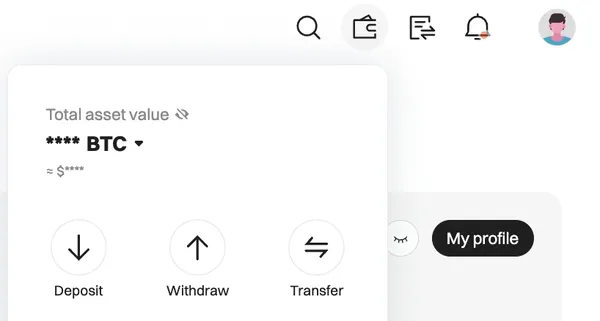
How to buy Euler (EUL) in Malawi
Simple 3-step guide to buying EUL today in Malawi
Step 1: Create a free account on the Bitget website or the app
Step 2: Place an order for Euler using a payment method of your choice:
Buy Euler with a debit/credit card
For Visa or Mastercard, select Credit/Debit card, then click Add New Card under the "Buy" tab Credit/Debit in the Buy Crypto tab of the Bitget app
Credit/Debit in the Buy Crypto tab of the Bitget app Credit/Debit in the Buy Crypto tab of the Bitget websiteSelect your preferred fiat currency, enter the amount you wish to spend, link your credit card, and then complete your payment with zero fees.
Credit/Debit in the Buy Crypto tab of the Bitget websiteSelect your preferred fiat currency, enter the amount you wish to spend, link your credit card, and then complete your payment with zero fees. Add a new card to complete your payment on the Bitget app
Add a new card to complete your payment on the Bitget app Enter your bank card details to complete your payment on the Bitget websiteFor Diners Club/Discover card, click Buy Crypto > [Third Party] in the top navigation bar to place your Euler order.How to buy crypto with credit/debit card
Enter your bank card details to complete your payment on the Bitget websiteFor Diners Club/Discover card, click Buy Crypto > [Third Party] in the top navigation bar to place your Euler order.How to buy crypto with credit/debit cardBuy Euler with Google Pay or Apple Pay
Converting your Google Pay and Apple Pay balance into Euler is easy and secure on Bitget. Simply click Buy Crypto > [Third Party] in the top navigation bar to place your Euler order.How to buy crypto via third-party gatewayBuy Euler with bank transfer
We accept various payment methods, including iDeal and SEPA for EUR, PIX for BRL, PayID for AUD, UPI for INR, QRIS, DANA, and OVO for IDR, SPEI for MXN, and GCash for PHP. These services are facilitated by Alchemy Pay, Banxa, Mercuryo, and Simplex payment gateways. Simply select Buy Crypto > [Third Party] in the top navigation bar and select a fiat currency to place your Euler order.Buy Euler with the fiat balance in your Bitget account
You can Deposit fiat funds using Advcash, SEPA, Faster Payments, or PIX payment gateways to top up your Bitget fiat balance. Then, click Buy Crypto > [Cash conversion] in the top navigation bar to place your Euler order.P2P trading
With Bitget P2P, you can buy crypto using over 100 payment methods, including bank transfers, cash, and e-wallets like Payeer, Zelle, Perfect Money, Advcash, and Wise. Simply place an order, pay the seller, and receive your crypto. Enjoy secure transactions with escrow protection.How to buy crypto on Bitget P2P
Step 3: Monitor Euler in your Bitget spot wallet

Latest Euler news
View moreBuy Euler
Bitget—where the world trades Euler
A smooth and seamless trading experience
Leading launch platform for high-quality early-stage projects
A wide variety of asset classes available for trading
Strict risk control system
Top-tier compliance
Buy and sell cryptocurrencies with 0 fees, supporting 140+ fiat currencies
Fee discounts with competitive transaction rates
Free deposits and low withdrawal fees
Bitget Academy and User Growth Program

FAQ
Can I buy $1 worth of Euler?
Can I buy $10 of Euler?
Where else can I buy Euler?
Where is the best place to buy Euler?
Should I buy Euler right now?
Buy Euler in a different country
Recently added coins
Explore other crypto guidesThe Great Rift Valley and the massive Lake Malawi divide the highlands that makeup Malawi, a landlocked nation in southeast Africa. Malawi has a population of 20,257,536 and the Malawian kwacha is its national currency. Using P2P trading and other crypto deposits, you may buy Euler(EUL) and other cryptocurrencies on the Bitget platform in under ten minutes.
The Bitget app and website are available in English, which is also Malawi's national language.
Chitipa, Chilumba, Ekwendeni, Karonga, Likoma, Aaron, Chipoka, Dedza, and Dowa are just a few of Malawi's stunning cities. You can start trading cryptocurrencies on the Bitget platform from anywhere in Malawi.
The highlands experience chilly weather, whereas the region around Lake Malawi experiences mild weather. The dry winter season (May to July) can be cool at night, especially in the highlands. It rains from November until March. The area around Lake Malawi experiences an unusually dry winter with cold breezes.
Following the dissolution of the Federation in 1963, Nyasaland adopted the name Malawi on July 6, 1964, marking the date as the country's Independence Day, a federal holiday. There are several beautiful sites in Malawi, including the Lilongwe Wildlife Center, Mount Mulanje, La Caverna Art Gallery, Nkhoma Mountain, and Kumbali Cultural Village.